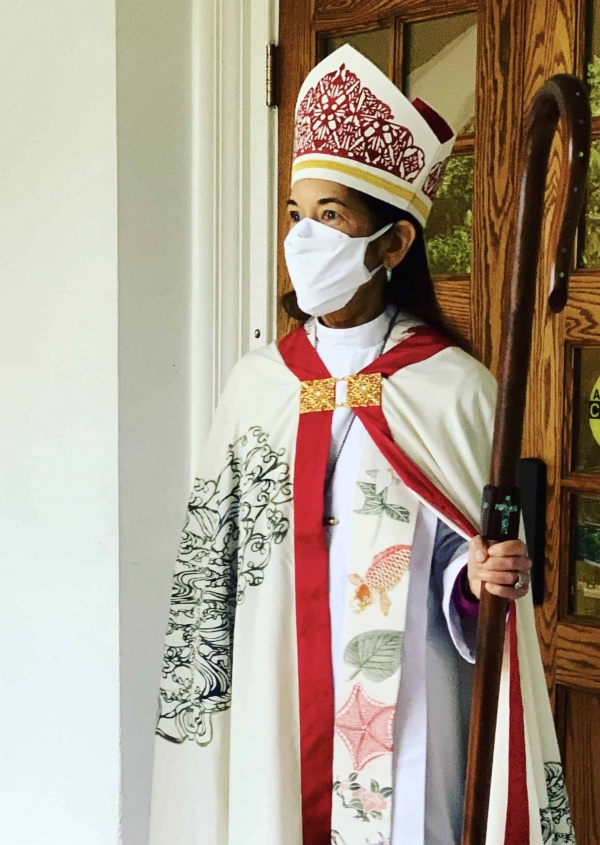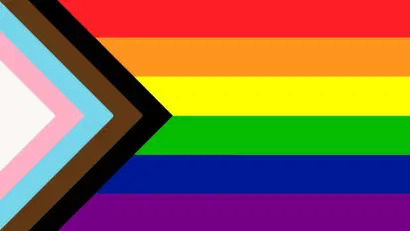Easter Message from Bishop Diana

“....[Mary] turned around and saw Jesus standing there, but she did not know that it was Jesus. Jesus said to her,“Woman, why are you weeping? Whom are you looking for?” Supposing him to be the gardener, she said to him,"Sir, if you have carried him away, tell me where you have laid him, and I will take him away.” Jesus said to her, “Mary!” She turned and said to him in Hebrew, “Rabbouni!”
The memorial service was over, and I was wired and tired. It was the kind of feeling one has after preaching. This time I was even more weary because it was my mother’s memorial service and, fulfilling her request, I had preached the sermon. I was standing in the hall at St. Mark’s, Hood River - the hall is a narrow passage that runs the length of the nave between the church and the rest of the building. I was trying to get to the sacristy to take off my vestments, and a woman approached me with a very friendly smile and said, “What a lovely service, Diana, I always thought your mom was special.” I smiled back and thanked her. She continued to speak, and I could tell she was very familiar with our family. So, I asked to know her name. Her face fell - she was crestfallen. She said, “I’m Peggy!” We’ve known each other since kindergarten but in that moment my disorientation and exhaustion along with the passage of time had blinded me to the face of a dear friend of old. Realizing how my question had hurt her, I took her face in my hands and gazed into her eyes and said, “Oh my goodness, my dear, of course!” And I hugged her.
I wonder about Mary in the account in the Gospel of John where she, grief stricken and bereft, encounters Jesus outside the tomb and mistakes him for the gardener. We tend to attribute her inability to recognize him to his transformed appearance as he ascends to become Christ. But it could also be true that it was her own condition that blinded her to her Christ. We certainly cannot fault her for this. We have just journeyed through Holy Week and, if we fully engaged the liturgies, we can relate to Mary’s state of mind. The weight of the trial, the condemnation and conviction, the awful crucifixion... feeling helpless while desperately loving this human man she thought would change her world of suffering. All this must have made her toss in restless sleep, and then wearied from her grief and exhaustion she mistook Jesus for the gardener. Her loss and grief temporarily altered her capacity to recognize a man she had loved.
This year-plus of pandemic has taken a toll on us. None of us will come through it unchanged. Some of us have lost family members or friends to the virus. Some of us have recovered from a frightening infection of the virus. Some of us are children who have struggled to continue learning while schools have been closed. Some of us have lost employment or entire businesses or homes. None of us will come through this unchanged. Our exhaustion can be heard in questions about the value of observing Lent this year: this whole pandemic year has been one long Lent. And Easter was supposed to be the celebration of being back together for Holy Eucharist. It was supposed to be a time when we were all back together - not just some of us, but all of us.
We are exhausted and very disappointed.
We are like Mary in the garden outside the tomb: bleary-eyed, weighted down with grief, exhausted, disoriented, and wondering what to do. And we, like Mary, might find ourselves unable to recognize our Christ as he stands right in front of us, speaking to us. Our hearts and souls are that heavy with troubles from this slog through the pandemic.
Even so, he ascended. He has risen. He shows us how and why to hope. His love is what brought us to this day. Although we may need to hear him call our names Mary! before we blink and truly see him, this day is the day that defines us. It is the day through which we find our identity: we are EASTER people. The resurrection shapes our lives because the risen Christ has shown us we are worthy of love, of forgiveness, of reconciliation, of new life.
This Easter it may be more difficult for us to truly see our Christ for the blindness from our exhaustion. I hope and pray that we will, each of us, allow ourselves to stop, blink again, and see, through our bleary eyes, who it is that has liberated us into this unending life in the heart of God. Jesus Christ is calling us, one by one, and by our names. He knows us and loves us that well.
Alleluia!
Christ is Risen!
+Diana
